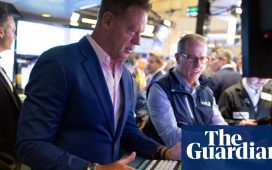It’s been a year since war broke out in Ukraine, and in that time, a lot has changed across markets worldwide. The overall story has been one of volatility, inflation and uncertainty, but also a fossil fuel bonanza with soaring oil and energy prices – and a frenzy to capitalise on the weapons industry.
That boom has spurred a huge increase in venture capital activity in the European aerospace and defence sector. Companies raised over $30 billion (£25 billion) in 2022, more than tripling from the year before, according to PitchBook data.
Morningstar PitchBook collects comprehensive data on the private equity and venture capital space. Geopolitical instability, large increases in government defence budgets, and the recovery in commercial airline travel have all contributed to renewed interest in the aerospace and defence industry. So we’ve investigated the deals that have taken place in the sector since the start of the conflict.
PitchBook’s data reveals that the year 2022 surpassed both 2018 and 2021 in terms of capital raised – the two best years on record, both with around $10 billion invested – by triple. The majority of the $33.63 billion raised came from mergers and acquisitions ($22 billion), but also private equity and venture capital grew significantly compared to previous years. PE deals almost reached $10 billion alone, while VC deals passed the $1 billion mark for the first year on record, with deals worth $2.38 billion.
It’s worth noting that these figures include the ones PitchBook has data on and excludes those of unknown deal size, as well as companies that have since gone out of business.
Big Defence Players are Profiting
While a lot of money was raised in private markets, we also know listed stocks have soared too. As we covered earlier this week, the six largest defence companies listed in Europe – the UK’s BAE Systems (BA.), Thales (HO) and Dassault Aviation (AM) in France, Leonardo (LDO) in Italy, Rheinmetall (RHM) in Germany and Saab (SAAB B) in Sweden – have seen their share price jump between 35% and 136% since Russia’s invasion of Ukraine. BAE Systems also reported its full-year results today, revealing that 2022 was a record year for orders.
Rheinmetall is the top acquirer in the European aerospace and defence sector according to PitchBook, having completed 14 acquisitions since our records began.
This includes one of the biggest deals of 2022: Rheinmetall’s acquisition of EXPAL Systems for $1.2 billion, or 1.4 times revenue, announced in November. EXPAL Systems is another player in the precision munitions space as well as other weapon systems, and the idea is that the acquisition will bolster Rheinmetall’s core weapon, ammunition, and propellant business.
Sweden’s Saab is also one of the top acquirers within aerospace and defence, with seven deals worth $536 million, but its last deal was in 2020.
Two more deals are worth noting beyond this list. Outside Europe, there’s Aerojet Rocketdyne’s agreement to be acquired by L3Harris for $4.7 billion, or 21.7 times earnings and 2.0 times revenue, according to PitchBook’s 2022 Annual Global M&A Report.
Plus, the biggest deal for the period is the takeover of UK-listed Meggitt by US firm Parker Hannifin (PH) but the acquisition, while completed in September 2022, was agreed before the outbreak of the war.
Aviation Set to Soar, Too
It’s not all about defence companies though. Since February 2022, 40 European deals have been announced in total, and the biggest deal was in aerospace. SMBC Aviation Capital’s acquisition of aircraft leasing firm Goshawk Aviation was announced in May and completed just days before Christmas.
Plus, wide-moat OEM manufacturer Safran (SAF) is the second biggest acquirer in the entire sector when sorted by the number of deals, just behind Rheinmetall with 11 acquisitions. The total value of the deals is $9.09 billion, compared to $1.38 billion for Rheinmetall. According to my colleague Jocelyn Jovene, OEM or original equipment manufacturers have a positive outlook as they are set to benefit from maintenance contracts of an already installed base, on top of selling new engines.
The View From the Other Side: Russia
Also noteworthy is the 10 deals made by Russian Helicopters. The company is engaged in the production and sale of commercial and military helicopters for governmental and commercial operators. It also manufactures rotor blades and tail rotors for these helicopters.
The company was place on the US sanctions list in March 2022, having already been placed on the EU sanctions list. Sanctioning the holding company, as well as 15 other related companies, the US Office of Foreign Assets Control said: “Russian Helicopters was designated for operating or having operated in the defence and related materiel sector of the Russian Federation economy.” (Read more on the UK sanctions regime here.)
PitchBook’s data shows that the company hasn’t made any investments since 2017, when it acquired military and commercial helicopter developer Kamov. The same year, it also launched a joint venture with Hindustan Aeronautics (HAL) and Rosoborobexport to create Indo-Russian Helicopters, a manufacturer of military and air force helicopters, based in Bangalore, India.
The UK Biggest in Europe
Overall in Europe, most of the sector deals have taken place in the UK. PitchBook records 733 deals worth $45 billion in the UK alone, with the dataset going back to the 1930s. France has completed the second highest number of deals (514), with the second-highest total value, at $24 billion.
Germany and Russia are third and fourth: 292 deals worth $9.9 billion, and 254 deals worth $6.5 billion, respectively. But both the Netherlands and Ireland beat them on total deal size: $14 billion across 119 deals and $13 billion across 55 deals, respectively.
Ukraine is the country with the 10th lowest total deal size, with $13 million across 22 deals.









